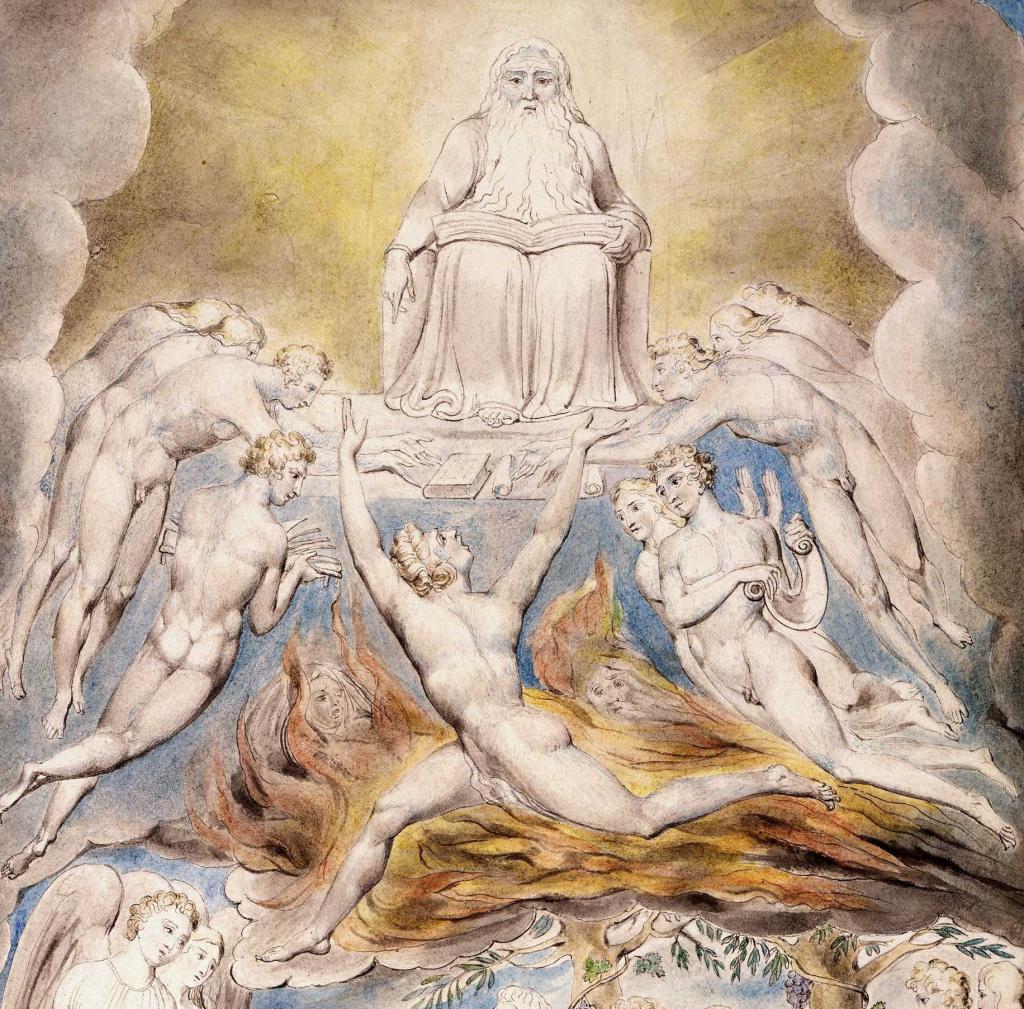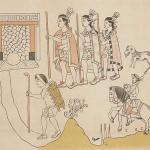The Old Testament commands the Israelites not just to fight and defeat other peoples such as the Canaanites and Amalekites, but to exterminate them, to commit what any modern reader would define as genocide. Today, such commands are extremely troubling, and Jews and Christians alike have agonized over them through the centuries. But such concerns are anything but new. From the earliest Christian ages, we find readings and responses that sound very modern in tone, and in a few cases, it is hard to avoid favoring the heretical side. One of those heretics in particular, a North African named Faustus, deserves to be much better known than he is today.
No less significant, those debates touch on questions that are still controversial today, and specifically about how far the Old Testament should be seen as prefiguring the New. Just what should Christians do with the Old Testament?
Two Gospels?
Through large sections of Christian history, influential Dualist sects drew a sharp contrast between the inferior God of the Old Testament, and the pure deity of the New. In this, they were following on neatly from the old Gnostics, who so alarmed and disgusted the mainstream church in the earliest centuries. But where did Gnostics and Dualists get this radical idea? In part, they were inspired by reading the Bible itself, and the moral horror they felt when they explored sections of the Old Testament, particularly the commands ordering war and genocide.
Many held that the genocidal texts were allegorical. But if they were not, they were so outrageous as to be the work of an inferior and indeed evil God, a Dark Father utterly different from the figure revealed by Jesus in the New Testament. One advocate of this stance was the second century thinker Marcion. The main thrust of his critique was on moral grounds, directed against a God who acted like a capricious tyrant. Marcion found in the Old Testament a God who was “the author of evils,” one who was seen “to take delight in war, to be infirm of purpose, and even to be contrary to Himself.”
Marcion loathed the idea of God hardening the heart of his victims, making them commit evils for which he could then punish them. He had a clear preference for those on the losing side in the Old Testament, those who appear as the villains and victims of the Hebrew narrative.
Troubled by his failure to reconcile the Old and New Testaments, he turned to two sayings attributed to Jesus: “A good tree cannot bring forth evil fruit,” and “No man puts a piece of new cloth on an old garment.” Through such words, thought Marcion, Christ was proclaiming that his gospel could not be reconciled with the Old Testament. Christianity must free itself of that pernicious pseudo-scripture and become an entirely new creation. To lay the foundation of this new religious order, Marcion prepared a new Bible—one that omitted the whole Old Testament and much of what we think of as the New.
Marcion’s influence was immediate and powerful. For one thing, it was probably his version of the New Testament that galvanized the mainstream church into declaring exactly what they thought the authentic canon actually was. The number of tracts written against Marcion and his school from all parts of the Christian world suggests just how widespread his followers were, and how far his influence extended.
The obvious problem with Marcion’s view is that it was of its nature anti-Judaic, and it opened the way to anti-Semitism. For that reason alone, I certainly would not place him on any list of thinkers we need to rediscover or revive. But on specific points of Bible interpretation, he was asking some good questions.
Of Light and Darkness
Gnostic and Marcionite sects lingered for centuries in the Middle East, and the survivors easily identified with the new religion of Manichaeism. The third century prophet Mani was a radical Dualist, teaching an absolute division between Light and Darkness. He saw Christ as a leader of the forces of light in the perpetual war against darkness and matter. Mani closely followed Marcion in his critique of the Old Testament, and the two relied on a similar corpus of Bible passages. Mani, like Marcion, mocked the notion of a united and harmonious Bible. As Mani wrote, “Some good God of the Law! He spoiled the Egyptians, expelled the Amorites, Girgashites and other nations and gave their land to the children of Israel. If He said, ‘Thou shalt not covet,’ how could he give them other people’s land?” That reference to the Amorites and Girgashites concerns the groups scheduled for destruction in the passages I have mentioned previously.
For over a thousand years, Manichaeism held the status of a fully fledged world religion. During the Middle Ages, Dualist/ Gnostic sects and churches operated across Eurasia, literally from France to China, preaching a Jesus who had come to redeem the world from the homicidal Creator God of the Pentateuch.
Faustus the Manichaean
One of the movement’s most famous representative was Faustus, “an African by race, a citizen of Mileum,” and a Manichaean bishop. I quote the Catholic Encyclopedia:
Born at Mileve of poor parents, he had gone to Rome, and being converted to Manichæism he began to study rhetoric somewhat late in life. He was not a man of profound erudition, but he was a suave and unctuous speaker. His fame in Manichæan circles was very great. He was a Manichæan episcopus and boasted of having left his wife and children and all he had for his religion. He arrived at Carthage in 383, and was arrested, but the Christians obtained the commutation of his sentence to banishment and even that was not carried out.
Faustus rejected the Old Testament, for reasons that can make excellent sense to many modern readers:
Faustus said: Do I believe the Old Testament? If it bequeaths anything to me, I believe it; if not, I reject it. It would be an excess of forwardness to take the documents of others which pronounce me disinherited. Remember that the promise of Canaan in the Old Testament is made to Jews, that is, to the circumcised, who offer sacrifice, and abstain from swine’s flesh, and from the other animals which Moses pronounces unclean, and observe Sabbaths, and the feast of unleavened bread, and other things of the same kind which the author of the Testament enjoined. Christians have not adopted these observances, and no one keeps them; so that if we will not take the inheritance, we should surrender the documents. This is my first reason for rejecting the Old Testament, unless you teach me better.
My second reason is, that this inheritance is such a poor fleshly thing, without any spiritual blessings, that after the New Testament, and its glorious promise of the kingdom of heaven and eternal life, I think it not worth the taking.
The Old Testament, he argued, was clearly and explicitly directed to Jews. Why should Gentiles think it had anything to do with them? If Christians did not observe the Sabbath or circumcision or the dietary laws, how and why should they lay the slightest claim to Jewish scriptures and traditions? That is not, of itself, an anti-Semitic or anti-Judaic comment, and indeed, many Jewish controversialists would say exactly the same thing. If you want to convert to Judaism, fine. If you are not converting, they would say, why do you hold on to our scriptures – and they are indeed our scriptures? Or to quote Faustus, “If we will not take the inheritance, we should surrender the documents….”
Faustus pointed out what he claimed were flagrant contradictions between the Pentateuch and the teachings of Jesus. Among many other criticisms, he listed at length the acts of violence and sexual depravity recorded about some of the greatest figures in the Old Testament, its patriarchs and prophets. Reading Faustus’s catalog of horrors, as penned before 400, we could easily be in the world of a Victorian freethinker or infidel: we could be reading Mark Twain’s Letters From the Earth. At least to some modern eyes, Faustus was making a solid case for the prosecution.
I won’t summarize Faustus in detail, but quite a few of his arguments (again) make excellent sense to a modern audience familiar with Bible criticism.
Augustine and Faustus
His attack on mainstream Christianity called forth St. Augustine’s tirade, the Contra Faustum (c.400). As Augustine protested, “Faustus blames God in the Old Testament for slaughtering thousands of human beings for slight offenses, as Faustus calls them, or for nothing.” Augustine mocked Faustus, but scarcely addressed his main points:
It would take too long to go through all the wars of Moses. It is enough to refer to what has already been said, as sufficient for the purpose in this reply to Faustus of the prophetic and symbolic character of the war with Amalek. There is also the charge of cruelty made against Moses by the enemies of Scriptures, or by those who have never read anything. Faustus does not make any specific charge, but speaks of Moses as commanding and doing many cruel things.
Yes, said Augustine, many of the acts described seem cruel or vicious, but they could be defended in various ways. Augustine argued that many of the most extreme stories had to be understood allegorically, as with the case of Amalek, but even if we did not use this let-out, God still remained uncondemned. If the violent actions were done in obedience to God, that fact in itself entirely justified them. God is absolute, and his standards above those of men. For Augustine, God “commands nothing but what is most just.” To say the least, these responses are problematic.
Does the Old Testament Prophesy Christ?
Faustus also raised critical questions about the Old Testament Prophets, and about the supposed prophecies of the future coming of Christ. We all know such passages, which are incorporated in Christian liturgy. This would include, for instance, the famous account of the Suffering Servant in Isaiah 53, or the “one like a son of Man” in Daniel. But early Christians knew, or thought they knew, literally hundreds of such examples. If the Old Testament had a passing reference to a tree or wood, then it was assuredly going to end up as a messianic prophecy of the Crucifixion. Water usually referred to the blood of Christ, and so on. So what did Faustus make of all this?
Faustus said: Why do I not believe the prophets? Rather why do you believe them? On account, you will reply, of their prophecies about Christ. For my part, I have read the prophets with the most eager attention, and have found no such prophecies. And surely it shows a weak faith not to believe in Christ without proofs and testimonies. Indeed, you yourselves are accustomed to teach that Christian faith is so simple and absolute as not to admit of laborious investigations. Why, then, should you destroy the simplicity of faith by buttressing it with evidences, and Jewish evidences too?
Augustine responds to Faustus’s attack on the Biblical passages that allegedly foretold Christ’s coming by citing a sizable number of examples that he found convincing, but which were heavily, outrageously, allegorical. To a modern reader, some of these might at best be described as a long stretch, while others are frankly ludicrous. If that statement seems excessive, then go to Augustine’s own text in ss.23-24, and see for example how he finds a prophecy of Christ in the strange Genesis tale of Noah being drunk, while his sons do their best not to see him naked (Gen. 9.20-27). Here is a sample:
Moreover, the two sons, the eldest and the youngest, carrying the garment backwards, are a figure of the two peoples, and the sacrament of the past and completed passions of the Lord. They do not see the nakedness of their father, because they do not consent to Christ’s death; and yet they honor it with a covering, as knowing whence they were born. The middle son is the Jewish people, for they neither held the first place with the apostles, nor believed subsequently with the Gentiles. They saw the nakedness of their father, because they consented to Christ’s death….
and so on, at length. Just read this in all its grotesque details. And then look at all the dozens of other Old Testament passages that are similarly subjected to such scriptural abuse. Seriously? How much of this can even the most faithful and orthodox Christian believer actually accept today?
As in the case of the genocidal passages, Augustine, the Orthodox Father, sees everything in terms of florid allegory, while Faustus the heretic reads the Bible historically and critically. There is no question which of the two approaches makes sense to a post-Enlightenment audience. In the contest with Augustine, it is Faustus who sounds like the grown-up in the room. The utter discredit into which that allegorical method of Bible reading has fallen creates an insuperable gulf between the earliest ages of the church and later generations. We are simply unable to read that language, except as a kind of intellectual archaeology.
Are we really meant to follow Augustine in believing that the Old Testament is a dense package of countless coded prophecies that only make sense in terms of the coming of Christ? Could there be a more supersessionist and anti-Judaic approach?
In terms of his own age, of course, Augustine certainly won the debate. In the sixth century, the Western church condemned the works of “Faustus the Manichaean,” and none have survived except where they are quoted by Orthodox scholars like Augustine. Even so, many Christians remained unconvinced by Augustine’s argument about the genocide texts, and chose to reject the whole Old Testament in the name of what they believed to be the principles put forward in the New.
For Faustus, see
Jason David BeDuhn, “The Manichaean Bishop Faustus : The State Of Research After A Century Of Scholarship,” in Johannes van Oort, ed., Augustine and Manichaean Christianity: selected papers from the first South African Conference on Augustine of Hippo, University of Pretoria, 24-26 April 2012 (Brill 2013)
Jason David BeDuhn, “Manichaean Biblical Interpretation,” in Paul M. Blowers and Peter W. Martens, eds., The Oxford Handbook Of Early Christian Biblical Interpretation (Oxford University Press, 2019)

















